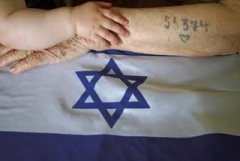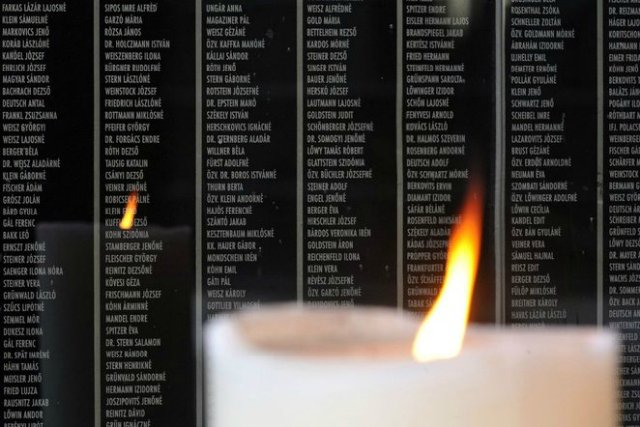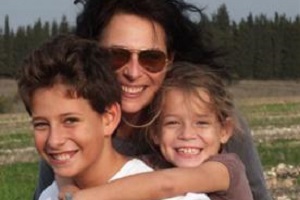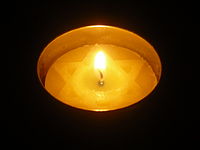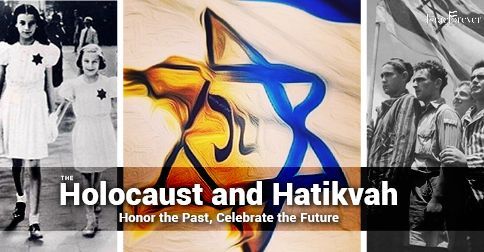Should I Be Here?
By Erica Hirsch Edvi
Sometimes I’m not sure I should be here.
Like many other Ashkenazi Jews, I am a grandchild of survivors. Those of us whose families saw the horrors inflicted upon the Jews of Eastern Europe feel fortunate that their parents and grandparents survived in spite of the Holocaust. If only it were that simple.
My maternal grandmother was just a teenager when her family was captured and deported from their Czech town to Auschwitz. It was only in post-war New York that she met my grandfather and they started a family.

The author's grandfather, Isak Hirsch z"l.
My father’s parents, however, are an entirely different story. As a girl I always thought it was odd that my mom’s mom seemed so young and active, while my father’s father seemed so much older. As I learned later on, it wasn’t just a difference in culture or personality. My Zaide (grandfather in Yiddish) was 20 years older than my Grandma. Zaide had a wife and two young sons, and was well into his thirties when the Romanian government started collaborating with the Nazis and deporting Jews.
Zaide was living in Satu Mare (home of the Satmar Chassidim) in 1943 when he was taken to the Russian front as a forced laborer. His wife, Rozalia, and their sons, Bela and Emil, were murdered by the Nazis.
His family destroyed, Zaide returned to Transylvania after the war, and later married my Bubbie (grandmother in Yiddish). In 1951 my father, Emil was born, named after the half-brother he would never know. Zaide was 44 at the time, and my father is an only child.

Holocaust memorial plaque from the Jewish cemetery in Gherla, Romania.
Since my childhood I’ve learned about the Holocaust and commemorated Yom HaShoah annually. I’ve written an oral history about my grandma, attended college courses about the Holocaust, and visited the Holocaust Museum in DC as well as Yad Vashem. I’ve been to Poland, walked through the gates of Auschwitz, said Kaddish amid the rubble of the gas chambers at Birkenau, and smelled the stench in the barracks of Auschwitz and the crematoria in Majdanek.
When I think about it, how can I accept the fact of my existence? If the war had never happened, I wouldn’t be here. My grandparents would never have married and my grandfather would have had another wife and children to love and care for. But if I say I’m grateful to be here, does that sound as if I’m thankful for an atrocity? That can’t be right. How do I reconcile my own presence in the aftermath of the nightmare my grandparents endured?
There is no real answer. I can let such existential questions consume me, or I can use those questions to cement my resolve to remember our painful past while looking with hope toward the future.
In so many ways, I have been blessed. I grew up knowing three of my four grandparents, a luxury my own parents never had. I received 13 years of formal Jewish education, and have spent my entire life immersed in the Jewish community in one way or another. I was given the gift of education, and when the time came to forge my own path, there was a modern Jewish state waiting to welcome me.

The author and her daughter in Caesarea.
Today I live in Israel, raising Jewish children, proud to be living a Jewish life in a Jewish country. That I embrace my Jewish identity and impart the stories of our history to my children is the best way to combat the question of “why am I here.” I’m here so that the memory of my grandparents, their siblings, parents, friends, and experiences remain alive and fresh in our minds. I’m here, a living example of the determination of the Jewish people to rebuild their lives and embrace their Jewish identity.
Most of all, I’m here of to pay tribute to those who came before me, and to those who perished merely for being Jews. Each year we say “never again.” I can’t think of a better way to ensure this than to celebrate being Jewish, to embrace our heritage, and to value the magic of the small strip of land on the Mediterranean coast that is our Jewish state.

